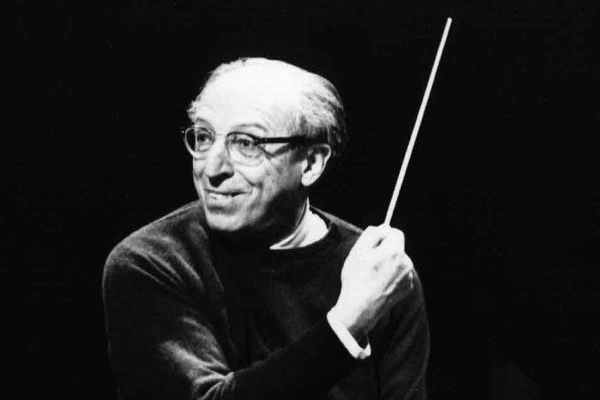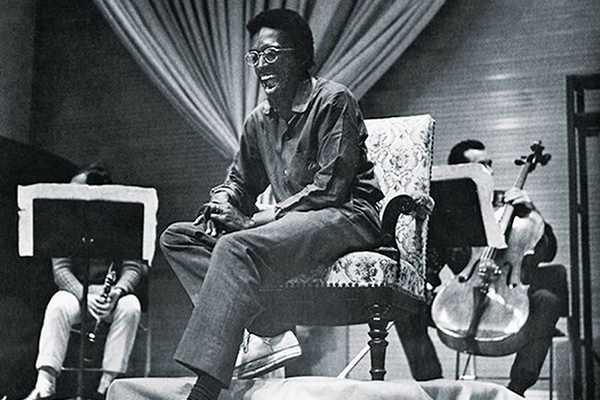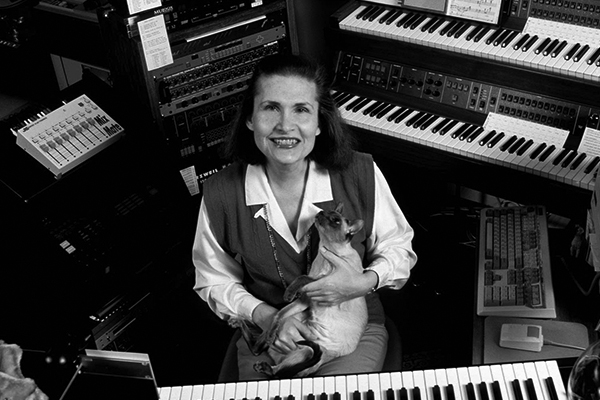Text by Ira Hafer
Throughout history, Queer composers have contributed to the canon of classical music. In honor of Pride Month in 2023, the New Haven Symphony Orchestra sheds light on the legacy of LGBTQ+ classical artists who have made incredible contributions to music history and culture, both past and present:

Photo Paul de Hueck
Leonard Bernstein, 1918-1990
One of the most renowned composers of the twentieth century, and certainly the most respected American conductor, Leonard Bernstein was the recipient of seven Emmy Awards, two Tonys, 16 Grammys, and the Kennedy Center Honor. His genres spanned orchestral music, ballet, film and theatre music, opera, and piano works, and throughout his career he would work with peers from Mahler to electronic music pioneer Wendy Carlos. Among his most notable works is the Broadway musical West Side Story, which has definitively sustained popular interest. He was among the first conductors to explore television as a way to share classical music with a wide audience and would go on to host episodes of the arts education program Omnibus and begin the family series Young People’s Concerts with the New York Philharmonic, of which Bernstein conducted 53 performances; the series is still ongoing and is the longest running program of its kind. Bernstein was also a lifelong humanitarian who protested against the Vietnam War, raised money for HIV/AIDS research, and advocated for nuclear disarmament during the Cold War. Bernstein began living openly as a gay man in the 1970s, and passed away in October 1990, at age 72.
Learn More about Leonard Bernstein’s Legacy.

Photo Erich Auerbach
Aaron Copland, 1900-1990
Aaron Copland was a pioneer of American classical music and was given the title “Dean of American Composers” by both industry peers and critics. He wrote music that aimed to be appealing to a wide audience, including producing music for ballets such as Billy the Kid and Appalachian Spring. He also produced chamber music, opera, and film scores. As a young man he studied in Paris under leading French music teacher and conductor Nadia Boulanger. Copland would go on to lecture on European classical music and write occasionally for The New York Times besides his career as a composer. Despite being influenced by classical artists like Chopin and Verdi, Copland wrote his own musical language using influences from jazz and folk music. His music and operas were not popular with critics but were well-received by the public. As a highly private person, Copland never formally ‘came out.’ However, he did live openly as a gay man and traveled often with his male partners. After his death, most of his wealth was distributed to the Aaron Copland Fund for Music, which stills grants tens of thousands of dollars to musicians annually.
Learn More about Aaron Copland’s legacy.

Photo Gordon Parks
Samuel Barber, 1910-1981
Samuel Barber is among one of the most celebrated composers of the twentieth century. Having written his first operetta at age 10, he would go on to compose both instrumental and vocal music. His work was premiered by major symphonies such as the Boston Symphony Orchestra, the New York Philharmonic, the Metropolitan Opera, and the Philadelphia Orchestra, and most of his compositions have been recorded. He was a Pulitzer Prize recipient and had an international reputation bolstered by appearances such as that with the Berlin Philharmonic and his attendance at the biennial Congress of Soviet Composers in Moscow (Barber was the first American to attend the latter). Barber’s notable compositions include the opera Antony and Cleopatra, the ballet Medea, and the cantata Prayers of Kierkegaard which was based on the work and prayers of Søren Kierkegaard. Barber met Gian Carlo Menotti at age 18 and they entered a relationship that spanned more than 40 years; Barber considered Menotti his lifetime partner, even after their romantic relationship ended in 1970. Samuel Barber passed away from cancer in 1981.
Learn More about Samuel Barber’s legacy.

Photo Jim Tuttle
Julius Eastman, 1940-1990
Julius Eastman was an American composer who is frequently affiliated with musical minimalism. Always something of a misfit, his music combined processes of various genres of music, including elements of pop music and disco, and often gave his pieces bold titles such as “Gay Guerilla.” Eastman was a classically trained pianist-turned-composer who shirked the traditional and embraced the avant-garde as he grew into his career post his education at the Curtis Institute of Music in Philadelphia; he would describe the music that came out of this later period as ‘organic,’ with few subtractions made in his compositions from first draft to final result. He lived in extremes, whether he was the subject of critical acclaim or controversy, living well or homeless. He was incredibly authentic: Eastman was proudly Black and gay in the 1970s, fluently alternated personal pronouns, wore dresses during his performances, and even reimagined classical hymns such as Martin Luther’s “A Mighty Fortress is Our God” as a ‘gay manifesto.’ Following eviction from his apartment and subsequent homelessness, many of his scores were destroyed and forever lost, but what remains is as powerful and moving now as it was when first composed.
Learn More about Julius Eastman’s legacy.

Photo Ebet Roberts
Wendy Carlos, Born 1939
Wendy Carlos is an American composer who is most famous for her role in the early development of electronic music and for her film scores. A graduate from Columbia University with a master’s degree in music composition, she presented an evening of electronic music at the Philharmonic Hall (now the David Geffen Hall at the Lincoln Center) with Leonard Bernstein. Her breakout project was her 1968 record Switch-On Bach, an album that used an early synthesizer to reproduce pieces by Johann Sebastian Bach. Because synthesizers were so early in their development, the process of creating the album was long and difficult, but the result was a commercial and critical hit that helped legitimize the synthesizer as a serious musical instrument. The fame was unexpected for Carlos, who, as a transgender woman, had begun gender transition by the time of Switch-On Bach’s release; she became the subject of public ridicule and physical attacks that made her fear for the future of her career. Still, she won three Grammy Awards in 1970, for Album of the Year (Classical), Best Classical Performance, and Best Engineered Recording (Classical) for her efforts on Switched-On Bach. Carlos was the first transgender person to win a Grammy Award, and she would go on to compose scores for Tron (1982), A Clockwork Orange (1971), and The Shining (1980). Her career is living evidence that electronic and classical music are not genres at odds with each other, but rather, are necessarily intertwined.
Learn More about Wendy Carlos’s legacy.

Photo Armin Linke
Meredith Monk, Born 1942
Meredith Monk is a multidisciplinary artist and composer who incorporates visual components into her work to evoke feelings and emotionality. She has consistently pushed the boundaries of soundscapes during her musical career using unorthodox vocal and musical techniques, allowing her voice to act as an instrument and using her entire body during performances. Monk has composed operas for the Houston Opera, as well as scored music for films such as The Big Lebowski (1998) and Jean-Luc Godard’s Notre musique (2004). The Kronos Quartet has commissioned scores from Monk and her music has been celebrated in concerts honoring her legacy by artists such as Björk and Terry Riley. Monk has also been recognized with many awards, such as the National Medal of Arts, given to her in 2015 by President Barack Obama. She is openly lesbian and since 2015 has been the composer in residence for Carnegie Hall.
Learn More about Meredith Monk’s legacy.
These artists and more can be heard on Spotify and YouTube. Happy Listening! 🏳️🌈
Ira Hafer is a student at Yale Divinity School, summer fellow for the New Haven Symphony Orchestra, and classical music enthusiast.

